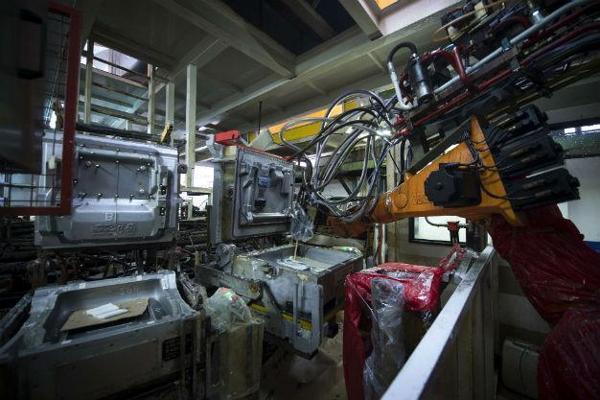Slower rise in Turkish manufacturing sector: Index
ISTANBUL - Doğan News Agency


AFP photo
The Istanbul Chamber of Industry (ISO) Turkey PMI Manufacturing Index declined to 50.9 in the first month of 2016, indicating continuous growth in the manufacturing sector despite its loss of speed.Reflecting a renewed weakening of the Turkish Lira, input price inflation in the manufacturing sector accelerated for the first time in four months in January. Meanwhile, firms raised their own prices at the fastest rate in three months.
According to the PMI Index released by Markit Istanbul, the PMI remained above the no-change mark of 50.0 in January, indicating an overall improvement in manufacturing business conditions in the Turkish goods-producing sector. Thus, the current upturn stretched to three months, said Markit’s statement.
The headline figure also fell to 50.9 in January, from last December’s 13-month high of 52.2, signaling a weaker overall rate of growth. This was “in line with its long-run survey average during the latest period.”
Contrasting with the rise in volume of new orders received by Turkish manufacturers, export business fell during the month due to “geopolitical factors and uncertainty.” Meanwhile, input price inflation accelerated for the first time in four months, after having hit the rock bottom in December 2015.
“Turkey’s manufacturers started 2016 in better shape than a year ago” said Trevor Balchin, Senior Economist at Markit.
“The PMI has now posted above 50.0 for three months in a row, and is currently in line with its historic average. That said, growth of new orders weakened, casting doubt on the near-term prospects for the sector. New export orders fell, linked to geopolitical factors and uncertainty. Moreover, the weakening currency resulted in renewed pressure on firms’ input prices during the month” he added.
“New export orders fell for the first time in six months, as some companies reported uncertainty and geopolitical factors had weighed on international demand. Meanwhile, input price inflation strengthened from [last] December’s recent low” said the statement.
The headline Istanbul Chamber of Industry Turkey Manufacturing PMI is a composite single-figure indicator of manufacturing performance. It is derived from indicators for new orders, output, employment, suppliers’ delivery times and stocks of purchases. Any figure greater than 50.0 indicates overall improvement in the sector.
Istanbul manufacturing ‘contracts again’
Manufacturers in Istanbul also experienced deteriorating business conditions at the start of 2016, according to the PMI survey data.
“Driving the reversal in manufacturing conditions in January was a fall in the volume of incoming new work,” said the statement.
The PMI fell to 49.5 in January, from 51 in December 2015, indicating an overall deterioration in business conditions across Istanbul’s manufacturing sector at the start of 2016.
The latest figure signaled a marginal rate of decline that was weaker than those registered from January 2015 to November 2015, as well as the downturn in mid-2014.
“Manufacturers in Istanbul suffered a renewed downturn in business conditions in January, as new orders failed to build on December’s short-lived resumption in growth. Data suggested that weak export demand underpinned the overall decline, with some firms linking this to geopolitical tensions. Output and jobs broadly stagnated, and firms also faced renewed cost pressures due to the weak lira,” Balchin said.
